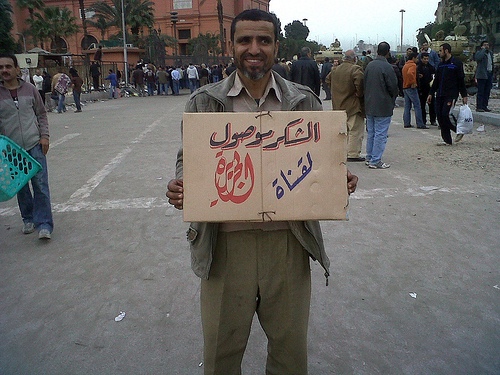The CPD Blog is intended to stimulate dialog among scholars and practitioners from around the world in the public diplomacy sphere. The opinions represented here are the authors' own and do not necessarily reflect CPD's views. For blogger guidelines, click here.
On numerous levels, the United States continues to fall farther behind China in public diplomacy. This is yet another indication that for all its protestations about its commitment to reach out to foreign publics, the U.S. government is unwilling to commit the resources needed to do so effectively.

First, let’s be clear that this was the Egyptian Revolution, not the “Facebook Revolution” or the “Twitter Revolution.” Events of the past few weeks belong wholly to spirit of the Egyptian people, not technology. And although it was built on democratic aspirations, this was not a revolution that drew any inspiration from the United States.
As events in Egypt move forward, the United States has appeared to be a befuddled bystander, reacting slowly and with a muted voice that cannot be heard above the din of those demanding freedom.
Not much was needed; just some phrasing such as, “President Mubarak has served his country well, and ensuring peaceful transition to new leadership would continue that service.”
If President Obama had said something like that, Hosni Mubarak would have been furious and probably ignored the advice, but Egyptians and others throughout the Arab world and beyond would have seen that for once the United States was not defending a dictator, but rather was standing on the side of democracy.
During the street demonstrations in Tunis, amidst the signs demanding “Ben Ali Out” were placards saying “Thank you, Al Jazeera.”
DOHA --- Money is a wonderful thing. Qatar has plenty of it and is putting it to use in its expanded public diplomacy. With wealth rather than weaponry, Qatar is becoming a new kind of superpower.
NEW DELHI --- “Incredible India.” For tourism purposes, that slogan has served India well, but it is insufficient to convey the identity of a rising world power.
BUDAPEST --- Here and there in downtown Budapest, the bullet holes remain. It was more than a half-century ago when Hungarian freedom fighters dared to take to the streets and do battle with the Soviet Union. Expecting help – apparently promised but never delivered – from the United States, the Hungarians were quickly outmatched and paid a terrible price at the hands of the Soviet military.
Pages
POPULAR ARTICLES
-
March 22
-
February 23
-
February 22
-
April 1
-
April 11
-
March 4
-
March 19
-
April 4
Featured Blogger
Join the Conversation
Interested in contributing to the CPD Blog? We welcome your posts. Read our guidelines and find out how you can submit blogs and photo essays >.








